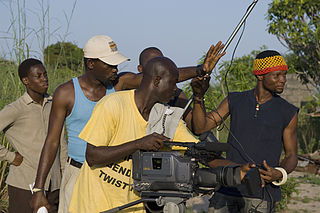Related Research Articles

The cinema of Nigeria, often referred to informally as Nollywood, consists of films produced in Nigeria; its history dates back to as early as the late 19th century and into the colonial era in the early 20th century. The history and development of the Nigerian motion picture industry is sometimes generally classified in four main eras: the Colonial era, Golden Age era, Video film era and the emerging New Nigerian cinema era.

Cinema of Africa covers both the history and present of the making or screening of films on the African continent, and also refers to the persons involved in this form of audiovisual culture. It dates back to the early 20th century, when film reels were the primary cinematic technology in use. As there are more than 50 countries with audiovisual traditions, there is no one single 'African cinema'. Both historically and culturally, there are major regional differences between North African and sub-Saharan cinemas, and between the cinemas of different countries.

This Is Nollywood is a 2007 Nigerian documentary film by Franco Sacchi and Robert Caputo, detailing the Nigerian film industry, much along the same lines as the acclaimed 2007 documentary Welcome to Nollywood by Jamie Meltzer
Chico Ejiro was a Nigerian movie director, screenwriter, and producer. Little was known about Ejiro other than he was born in Isoko, Delta, Nigeria; he originally studied agriculture; and he was drawn into video production because Nigerians would not buy blank video cassettes. His enormous body of work was typical of the second generation that started in the 1990s when cheap video-production equipment became available in the country. He owned a production company called Grand Touch Pictures, which is based in Lagos.
Mak ’Kusare is a Nigerian film director who won three awards for his first feature length film Ninety Degrees in 2006 at the Zuma Film Awards in Abuja, Nigeria. He wrote, directed and produced the film entirely on location in Jos, Nigeria. The film won Best Director, Best First Film/Video of a Director and Best Feature Film awards. ’Kusare has also produced for radio, television and video.
Jamie Meltzer is an American movie and documentary film director. He has made "True Conviction", "Off the Charts: The Song-Poem Story", "Welcome to Nollywood", "La Caminata", and the feature-length documentary film "Informant". He teaches documentary film production in the Art Department of Stanford University, as part of the MFA Program in Documentary Film.

The Africa Movie Academy Awards, popularly known as AMAA and The AMA Awards, are presented annually to recognize excellence among professionals working in, or non-African professionals who have contributed to, the African film industry. It was founded by Peace Anyiam-Osigwe and is run through the Africa Film Academy. The awards are aimed at honouring and promoting excellence in the African movie industry as well as uniting the African continent through arts and culture.
Zina Saro-Wiwa is a Brooklyn-based video artist and filmmaker. She makes video installations, documentaries, music videos and experimental films.

Ayo Shonaiya is a filmmaker and lawyer, he was also a music talent agent who has managed many of Nigeria's artists. The list include Fuji musician Wasiu Ayinde Marshall, pop star D'banj, music producer Don Jazzy and rapper Eldee the Don. He has also represented former beauty queen and rapper Muna and global music star Akon. He is the founder of entertainment and media management company The RMG Company in the UK and Nigeria, and Managing Partner at the Lagos-based law firm Shonaiya & Co.
Lancelot Oduwa Imasuen is a Nigerian film director and film producer. Popularly known as De' Guvnor of Nollywood.
Michelle Bello is a British Nigerian film director and film producer. She is also CEO of a Nigerian-based entertainment and publishing company, Blu Star Entertainment Limited. Bello was born in London, England.

Judith Emike Audu-Foght, professionally known as Judith Audu, is a Nigerian film and television producer, director, casting director, actress, presenter, model and blogger. She is widely known for her movie production credits which include Just Not Married, The Family and The Sessions. In 2019, she was listed among the YNAIJA 100 most Influential Nigerians in Film.

Filmmaking in Colonial Nigeria generally refers to an era in Nigerian cinema, usually spanning the 1900s through to the 1950s, when film production and exhibition or distribution were controlled by the British colonial Government. The history of cinema in Nigeria dates back to as early as the history of film itself; notably in the late 19th century, with the use of peephole viewing of motion picture devices. These were soon replaced in the early 20th century with improved motion picture exhibition devices, with the first set of films screened at the Glover Memorial Hall in Lagos from 12 to 22 August 1903.

Golden Age or Golden era are terms used in Nigerian film history to designate the motion picture industry of Nigeria from the late 1950s to the late 1980s. It captures the mode of visual and sound production, as well as the method of distribution employed during this period. This period began with the formal recognition of the Nigerian Film Unit as a sector in 1954, with the first film entirely copyrighted to this unit being Fincho (1957) by Sam Zebba.

The video film era, also known as the home video era, is a period in Nigerian cinema, typically from the late 1980s / early 1990s to mid 2010s, when Nigerian films were made using affordable video format. The video boom era emerged after the downturn of the Golden era of the Nigerian cinema in the late 1980s. The term "home video" stems from the concept of staying at home to watch the films, in contrast to films of the Golden Age that were watched at the movie theatres.

New Nigerian Cinema or New Nigerian Cinema era is an emerging phase in Nigerian cinema, in which there became a major shift in the method of film production, from the video format, which came about during the video boom, back to the cinema method, which constituted the films produced in the Golden era of Nigerian cinema history. The films in the New Wave are specifically characterized by improved narrative complexity, aesthetic nuance, much higher budgets and advanced overall production values, when compared to video films from the second generation of filmmakers. They are mostly released theatrically, although some are still released directly on DVD.

Nollywood, a portmanteau of Nigeria and Hollywood, is a sobriquet that originally referred to the Nigerian film industry. The origin of the term goes back to the early 2000s, traced to an article in The New York Times. Due to the history of evolving meanings and contexts, there is no clear or agreed-upon definition for the term, which has made it a subject of several controversies.

Just not Married is a 2016 Nigerian heist drama film starring Stan Nze, Rotimi Salami, Roland Obutu, Judith Audu, and Brutus Richards. The film was written by Lani Aisida and directed by Uduak-Obong Patrick. The film was shot within Lagos State.

Tope Oshin is a Nigerian television and film director, producer and casting director, listed as one of the most influential Nigerians in film in 2019. In 2015 Pulse magazine named her as one of "9 Nigerian female movie directors you should know" in the Nollywood film industry. and in March 2018, in commemoration of the Women's History Month, Tope was celebrated by OkayAfrica as one of the Okay100 Women. The interactive campaign celebrates extraordinary women from Africa and the diaspora making waves across a wide array of industries, while driving positive impact in their communities and the world at large.
Steve Gukas is a Nollywood filmmaker, director and producer who believes that films should be used to address the ills of the society.